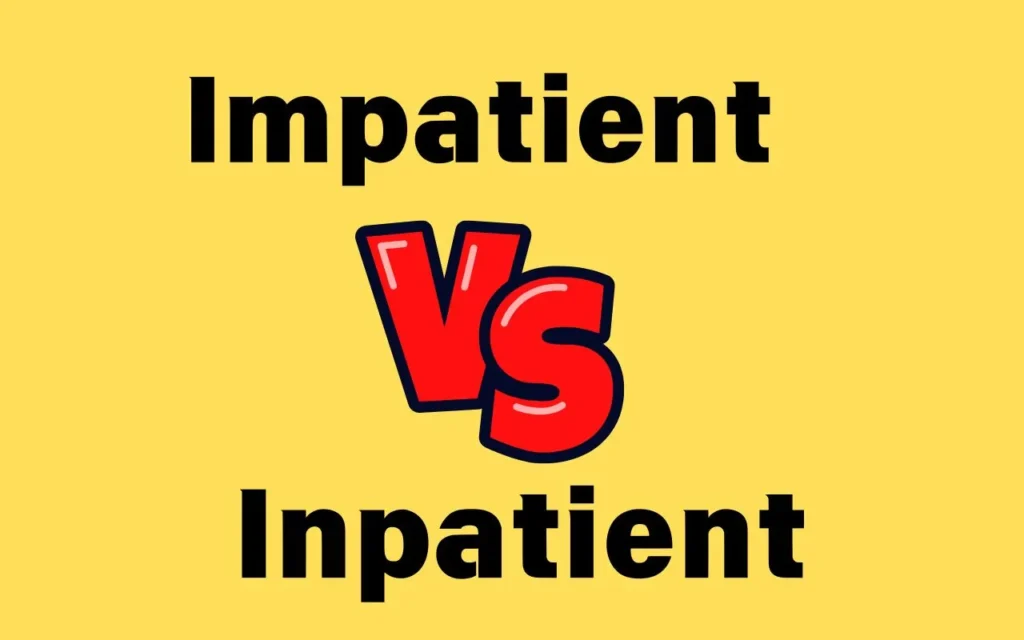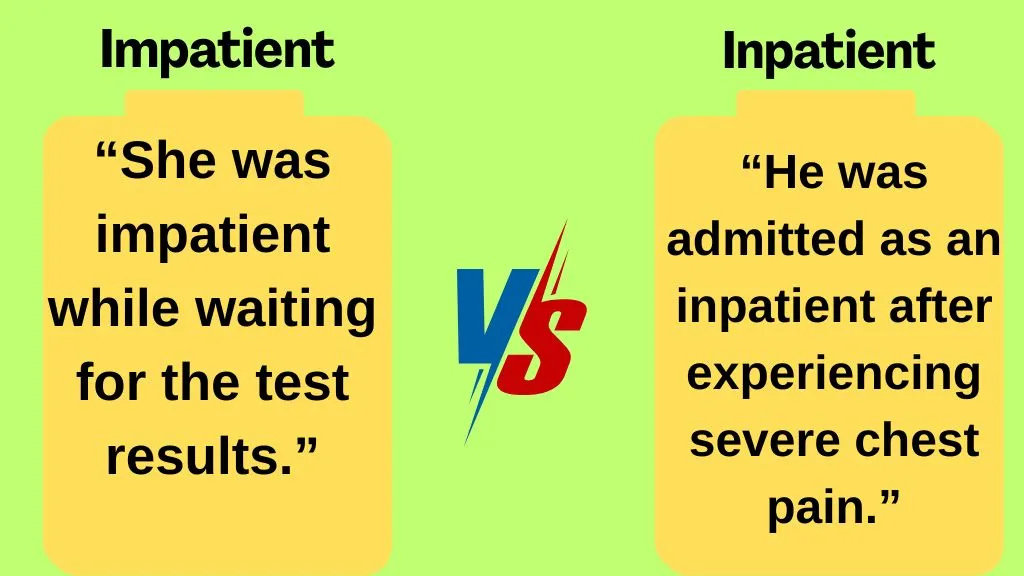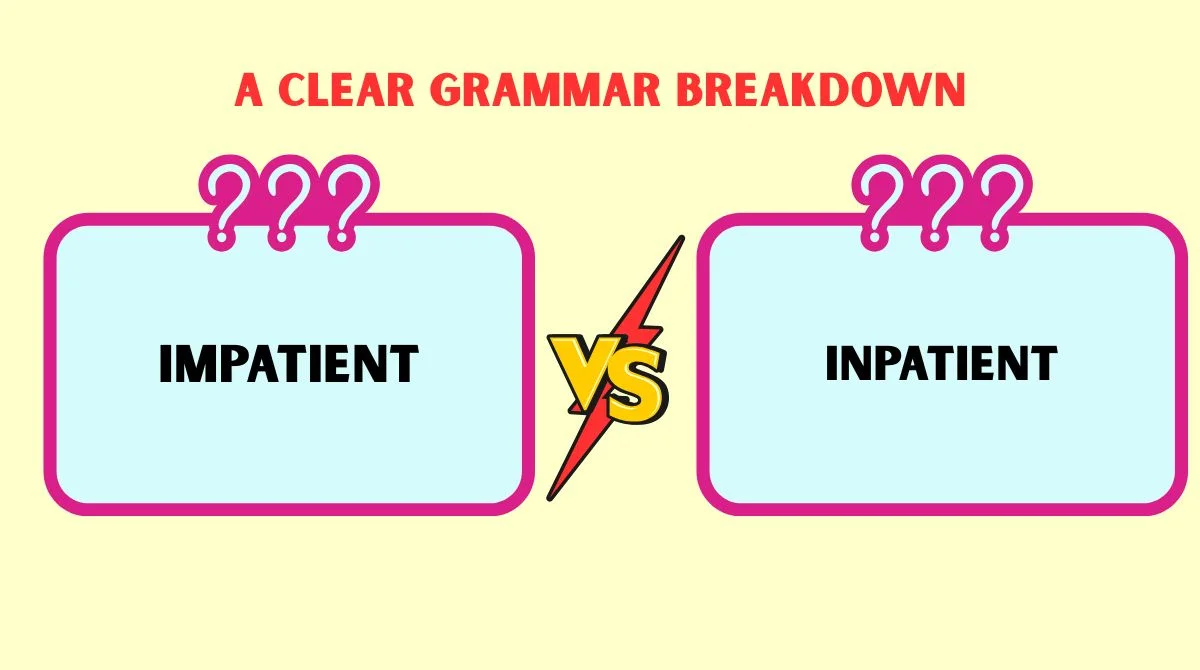Last updated on September 23rd, 2025 at 08:18 am
English can be a tricky language, especially when words look or sound similar but mean completely different things. Impatient and inpatient are prime examples of this.
While they might appear related at first glance, these words belong to entirely separate categories of meaning.
Confused between “impatient” and “inpatient”? One refers to emotions, while the other is a medical term! Learn their meanings and never mix them up again.
In this guide, we’ll explore their definitions, delve into their origins, and provide clear examples to help you remember the difference.
Exploring the Definition of “Impatient”

The word impatient is an adjective that describes a lack of patience or tolerance for delays.
It conveys the emotional state of being restless, eager, or annoyed when something isn’t happening as quickly as desired.
Key Characteristics of Impatient:
- Reflects a person’s emotional state.
- Indicates frustration or eagerness.
- Applies to situations where waiting or tolerating is difficult.
Example Sentences:
- She grew impatient waiting for the doctor to arrive.
- The child became impatient during the long car ride.
The Emotional Implications of Being Impatient
Impatience often stems from high expectations or urgency. While it’s a natural emotion, it can affect relationships, productivity, and personal well-being if not managed effectively.
Common Emotional Signs of Impatience:
- Irritability or frustration.
- Restlessness or fidgeting.
- An inability to focus due to eagerness for results.
Real-life Example:
Imagine waiting in line at the grocery store. If you’re tapping your foot, checking your watch, or sighing audibly, you’re likely feeling impatient.
Tip: Learning to manage impatience can improve your daily interactions and reduce stress.
Common Expressions Featuring “Impatient”
The term impatient frequently appears in common phrases and idioms:
- “Impatient to get started” – Describes eagerness to begin something.
- “Impatient for results” – Indicates frustration over delays.
- “Don’t be so impatient” – A reminder to stay calm and composed.
These expressions emphasize the emotional nature of impatience, often tied to an underlying sense of urgency.
The Linguistic Roots of “Impatient”
The word impatient originates from the Latin root “im-” (meaning “not”) and “patientem” (meaning “enduring” or “bearing”). Together, they form impatientem, meaning “not able to endure.”
Over time, this evolved into Middle English as impatient, retaining its meaning of an inability to tolerate delays.
Fun Fact:
The root patientem is also the basis for the word patient, showing the linguistic connection between tolerance and endurance.
The Meaning and Usage of “Inpatient”
Inpatient, on the other hand, is a noun or adjective used in a medical context. It refers to a person admitted to a hospital or clinic for treatment that requires an overnight stay.
Key Characteristics of Inpatient:
- Specifically tied to healthcare settings.
- Involves prolonged medical care, unlike outpatient treatments.
- Focuses on individuals who stay at a facility for observation or treatment.
Example Sentences:
- The hospital admitted him as an inpatient for further evaluation.
- Inpatient care often includes 24-hour monitoring.
Clarity in Context: “Impatient” and “Inpatient” in Sentences

To understand the difference, let’s see both words in action:
| Word | Example Sentence |
|---|---|
| Impatient | “She was impatient while waiting for the test results.” |
| Inpatient | “He was admitted as an inpatient after experiencing severe chest pain.” |
Key Difference:
- Impatient describes an emotional state.
- Inpatient refers to a medical status.
Identifying “Impatient” in Everyday Language
You’ll often hear or see impatient used to describe common situations, especially where delays or waiting are involved.
Examples of Impatient Behavior:
- A customer tapping their fingers while waiting in line.
- A driver honking their horn in traffic.
- A child asking repeatedly, “Are we there yet?”
Quick Tip: If the context is emotional or behavioral, impatient is likely the correct choice.
Understanding “Inpatient” Through Examples
The word inpatient is almost exclusively used in healthcare contexts. It differentiates between patients who stay in a facility and those treated on an outpatient basis (who return home the same day).
Examples of Inpatient Scenarios:
- A patient undergoing surgery that requires post-operative monitoring.
- Someone admitted to a psychiatric hospital for treatment.
- A person receiving chemotherapy that necessitates an overnight stay.
Table: Inpatient vs. Outpatient
| Aspect | Inpatient | Outpatient |
|---|---|---|
| Stay Duration | Overnight or longer | Same-day treatment |
| Examples | Surgery, critical care, rehab | Routine check-ups, minor procedures |
Remembering the Difference: Tips and Tricks
If you struggle to remember which word to use, try these tips:
- Think of the “I” in impatient: It’s about inner feelings like frustration or eagerness.
- Focus on “In” in inpatient: It refers to being in a hospital or medical facility.
- Visual Mnemonic: Picture an impatient person pacing back and forth versus an inpatient resting in a hospital bed.
Common Misconceptions and Errors to Avoid
Mistake 1: Confusing Emotional with Medical Contexts
- Incorrect: “He felt inpatient waiting for the doctor.”
- Correct: “He felt impatient waiting for the doctor.”
Mistake 2: Overusing Spell-Check Without Context
Autocorrect might not flag these words since both are valid, so context is crucial.
Mistake 3: Assuming They’re Related
While impatient and inpatient share similar spelling, they are not related in meaning.
FAQs
What is the difference between “impatient” and “inpatient”?
“Impatient” describes a lack of patience or tolerance, while “inpatient” refers to someone admitted to a hospital for overnight care.
Can “impatient” be used in medical contexts?
No, “impatient” refers to emotions like frustration or eagerness. For medical settings, use “inpatient” when referring to hospital stays.
What are some examples of “inpatient” usage?
“Inpatient” is used in healthcare scenarios, such as:
- “He was admitted as an inpatient for surgery.”
- “Inpatient care involves overnight monitoring.”
How can I remember the difference between “impatient” and “inpatient”?
Think of the “I” in “impatient” for emotions (inner feelings), and “in” in “inpatient” for being in a hospital.
What are common mistakes people make with these words?
People often confuse the emotional context of “impatient” with the medical term “inpatient.” Proofreading and understanding context can help avoid errors.
Conclusion
While impatient describes an emotional state and inpatient refers to a medical term, both words are essential in English and serve very different purposes.
By understanding their definitions, contexts, and origins, you’ll be able to use them with confidence.
If this guide has helped clear up the confusion, share it with others who might also find these words puzzling!
